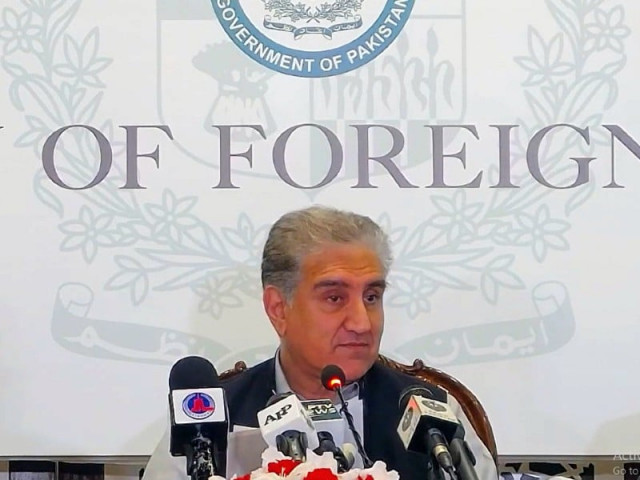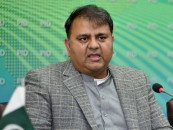‘Capitulation’ of Afghan forces not Pakistan’s fault
Qureshi says Pakistan cannot be made scapegoat for mess in neighbouring country

Foreign Minister Shah Mehmood Qureshi on Monday dispelled the impression that Pakistan was the reason behind the current mess in Afghanistan, stating that Islamabad could not be held responsible for the “capitulation and meltdown” of the Afghan national defence forces in the face of the Taliban.
At a news conference, Qureshi told reporters in categorical terms that Pakistan could not be made scapegoat and emphasised that instead of blaming Pakistan, the international community should ponder over “where did the amount of money spent in Afghanistan go?”
LIVE #APPNews : Foreign Minister Shah Mahmood Qureshi addressing press conference #Islamabad . @SMQureshiPTI @TeamSMQ @ForeignOfficePk
— APP 🇵🇰 (@appcsocialmedia) August 9, 2021
https://t.co/LLIfMCqAvE
The Taliban have swiftly gained territory across Afghanistan since May, including six provincial capitals in the last three days, as international forces near a complete withdrawal from the country after 20 years of fighting.
As the Afghan situation deteriorates, there are elements within and outside Afghanistan, who have increased their rhetoric against Pakistan, blaming Islamabad for the chaos, particularly the allegations of using the Taliban as proxy to impose a government of its choice in Kabul.
Also read: Islamabad mulls regional moot on Kabul
“It is unfortunate to scapegoat Pakistan for the failures of others. Issues of governance and meltdown of the Afghan national defence forces need to be looked into,” he said, referring to the rapid Taliban gains in many areas, without facing any resistance from the Afghan forces.
“The lack of will to fight, the capitulation that we are seeing in Afghanistan... can we be held responsible for that? No we cannot,” he said, adding, instead of blaming Pakistan, the international community should ponder over where did the amount of money spent in Afghanistan go?
“The capacity-building, the training, the equipment... where is it?” Foreign Minister Qureshi said, referring to resources spent by the international community, particularly the United States, on bolstering Afghan national forces. Qureshi said Pakistan supported a political solution to bring peace to Afghanistan and reminded that Islamabad had been instrumental in bringing the Taliban to the negotiating table with the United States and facilitated the resultant agreement between the two in Doha last year.
However, he made it clear that Pakistan was just a facilitator, and not a guarantor in the Afghan peace efforts. “If there is a political settlement the credit goes to Afghan government and if there is no political solution the Afghan government will be responsible,” he said. “We have repeatedly stated that we have no favourites in Afghanistan. We see all sides in the conflict as Afghans and we don’t differentiate,” he said, dismissing the oft-repeated allegations against Pakistan that it was backing the Afghan Taliban.
As the US and NATO forces withdrawal nears completion, Pakistan is concerned at the deteriorating security situation in the neighbouring country with no political settlement insight. “We are seriously concerned at the brewing violence and lack of substantive progress in the intra-Afghan talks.” The foreign minister went on to say that the situation in Afghanistan was evolving but “unfortunately it was not managed well”.
Questioning the US withdrawal plan, Qureshi stated that Pakistan always wanted “orderly and responsible” withdrawal. Explaining further, he said that an orderly withdrawal meant that there would be simultaneous progress both on the withdrawal process and the Afghan peace talks. But the troops withdrawal from Afghanistan was not backed by substantive progress on the peace talks, he added.
Also read: Afghan Air Force pilot killed in Kabul bombing, attack claimed by Taliban
Fearing that such a situation would leave a security vacuum in Afghanistan, the foreign minister stated that “a security vacuum” in the war-ravaged country would only benefit the terrorist groups, which were targeting Pakistan.
Qureshi suggested to the Afghan leadership that instead of wasting their energies on blaming Pakistan, they should focus on seeking inclusive and broad-based political settlement through an Afghan-led and Afghan-owned process. Foreign Minister Qureshi also came down hard on India, which currently holds the presidency of United Nations Security Council (UNSC) for barring Pakistan from the debate on Afghanistan at the 15-member top UN form.
He said that Pakistan should have been invited to the debate, given that it was not just a neighbour of Afghanistan but also a direct stakeholder in the peace and stability in the war-torn country. He said that India was in breach of the UNSC norms by not accepting Pakistan’s request. On August 6, the UNSC held an emergency session on the Afghan situation at the request of Kabul.
Pakistan had requested to join the meeting but that was not accepted by the UNSC president, who is currently the Indian permanent representative to the UN. Pakistan had issued a strong statement after that and insisted the UNSC president’s decision was not objective. Pakistan and India have been at loggerheads on many issues, including Afghanistan.
Islamabad considers New Delhi as a spoiler and often resists India’s more prominent role in the Afghan affairs. It was because of this reason that despite Indian efforts, New Delhi has not been included in the Extended Troika, which includes Pakistan, Russia, China and the US, on Afghanistan. The Extended Troika is scheduled to meet in Doha on August 11 to discuss the latest Afghan situation.
Qureshi said Pakistan was looking forward to the meeting with a hope to see some tangible outcome on the Afghan peace efforts.
(WITH INPUT FROM REUTERS)



















COMMENTS
Comments are moderated and generally will be posted if they are on-topic and not abusive.
For more information, please see our Comments FAQ